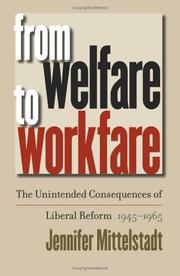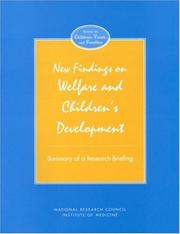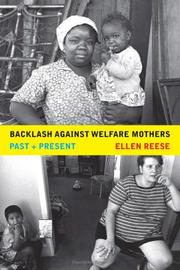| Listing 1 - 9 of 9 |
Sort by
|
Book
ISBN: 9780833090256 0833090259 Year: 2015 Publisher: Santa Monica, California : RAND Corporation,
Abstract | Keywords | Export | Availability | Bookmark
 Loading...
Loading...Choose an application
- Reference Manager
- EndNote
- RefWorks (Direct export to RefWorks)

ISBN: 0807876437 9780807876435 0807829226 9780807829226 0807855871 9780807855874 9798890877338 Year: 2005 Publisher: Chapel Hill ; London : The University of North Carolina Press,
Abstract | Keywords | Export | Availability | Bookmark
 Loading...
Loading...Choose an application
- Reference Manager
- EndNote
- RefWorks (Direct export to RefWorks)
This book locates the roots of the 1996 welfare reform many decades in the past, arguing that women, work, and welfare were intertwined concerns of the liberal welfare state beginning just after World War II. It examines the reform of Aid to Dependent Children (ADC) and reconstructs the ideology, implementation, and consequences of rehabilitation.
Aid to families with dependent children programs --- Poor women --- Welfare recipients --- Public welfare --- Feminization of poverty --- Women, Poor --- Poor --- Women --- ADC programs --- AFDC programs --- Aid to dependent children programs --- History --- Government policy --- Employment --- Economic conditions

ISBN: 0309056896 0309524229 0585142351 9780585142357 9780309056892 0305056896 9780309524223 Year: 1997 Publisher: Washington, D.C. National Academy Press
Abstract | Keywords | Export | Availability | Bookmark
 Loading...
Loading...Choose an application
- Reference Manager
- EndNote
- RefWorks (Direct export to RefWorks)
Aid to families with dependent children programs -- United States -- Psychological aspects. --- Child development -- United States. --- Aid to families with dependent children programs --- Child development --- Social Welfare & Social Work - General --- Social Welfare & Social Work --- Social Sciences --- Psychological aspects --- Psychological aspects. --- ADC programs --- AFDC programs --- Aid to dependent children programs --- Public welfare

ISBN: 0309060257 9780585143714 0309521696 0585143714 9780585143712 9780309521697 9780309060257 0305060257 Year: 1998 Publisher: Washington, DC : National Academy Press,
Abstract | Keywords | Export | Availability | Bookmark
 Loading...
Loading...Choose an application
- Reference Manager
- EndNote
- RefWorks (Direct export to RefWorks)
Unmarried mothers --- Single-parent families --- Welfare recipients --- Public welfare --- Aid to families with dependent children programs --- ADC programs --- AFDC programs --- Aid to dependent children programs --- Public welfare recipients --- One-parent families --- Single-parent family --- Unwed mothers --- Poor --- Families --- Single mothers --- Illegitimate children
Book
ISBN: 1281736732 9786611736736 0833046047 0833044990 9780833046048 9780833047854 083304785X 9780833042330 0833042335 Year: 2008 Publisher: Santa Monica, CA : RAND Corporation,
Abstract | Keywords | Export | Availability | Bookmark
 Loading...
Loading...Choose an application
- Reference Manager
- EndNote
- RefWorks (Direct export to RefWorks)
In 2004, the California legislature passed a bill that tightened the participation requirement for California?s welfare program, the California Work Opportunity and Responsibility to Kids program (CalWORKs) and mandated a study of CalWORKs sanction policy for participant noncompliance in the welfare-to-work program. RAND was asked by the California Department of Social Services to carry out this study. Researchers found that county welfare caseworkers? implementation of the state?s statutory sanction policy makes the sanctions weaker in practice than might have been expected given stated policy
Aid to families with dependent children programs --- Welfare recipients --- Fines (Penalties) --- California Work Opportunity and Responsibility to Kids (Program) --- Penalties (Criminal law) --- Public welfare recipients --- ADC programs --- AFDC programs --- Aid to dependent children programs --- Law and legislation --- CalWORKS --- Alternatives to imprisonment --- Civil penalties --- Poor --- Public welfare
Book
ISBN: 0202360482 Year: 1988 Publisher: New York (N.Y.) De Gruyter
Abstract | Keywords | Export | Availability | Bookmark
 Loading...
Loading...Choose an application
- Reference Manager
- EndNote
- RefWorks (Direct export to RefWorks)
Aid to families with dependent children programs --- Child welfare --- Evaluation research (Social action programs) --- Family social work --- ADC programs --- AFDC programs --- Aid to dependent children programs --- Public welfare --- Family case work --- Social work with families --- Family services --- Social case work --- Child protective services --- Child protective services personnel --- Children --- CPS (Child protective services) --- Humane societies --- Protection of children --- Family policy --- Social work with children --- Social work with youth --- Evaluation --- Charities --- Charities, protection, etc. --- Protection

ISBN: 1282771841 9786612771842 0520938712 159875520X 9780520938717 9781598755206 9781282771840 6612771844 9780520244610 0520244613 9780520244627 0520244621 Year: 2005 Publisher: Berkeley University of California Press
Abstract | Keywords | Export | Availability | Bookmark
 Loading...
Loading...Choose an application
- Reference Manager
- EndNote
- RefWorks (Direct export to RefWorks)
Backlash against Welfare Mothers is a forceful examination of how and why a state-level revolt against welfare, begun in the late 1940's, was transformed into a national-level assault that destroyed a critical part of the nation's safety net, with tragic consequences for American society. With a wealth of original research, Ellen Reese puts recent debates about the contemporary welfare backlash into historical perspective. She provides a closer look at these early antiwelfare campaigns, showing why they were more successful in some states than others and how opponents of welfare sometimes targeted Puerto Ricans and Chicanos as well as blacks for cutbacks. Her research reveals both the continuities and changes in American welfare opposition from the late 1940's to the present. Reese brings new evidence to light that reveals how large farmers and racist politicians, concerned about the supply of cheap labor, appealed to white voters' racial resentments and stereotypes about unwed mothers, blacks, and immigrants in the 1950's. She then examines congressional failure to replace the current welfare system with a more popular alternative in the 1960's and 1970's, which paved the way for national assaults on welfare. Taking a fresh look at recent debates on welfare reform, she explores how and why politicians competing for the white vote and right-wing think tanks promoting business interests appeased the Christian right and manufactured consent for cutbacks through a powerful, racially coded discourse. Finally, through firsthand testimonies, Reese vividly portrays the tragic consequences of current welfare policies and calls for a bold new agenda for working families.
Single mothers --- Aid to families with dependent children programs. --- Welfare recipients --- Public welfare --- Mothers --- Single parents --- Single women --- ADC programs --- AFDC programs --- Aid to dependent children programs --- Government policy --- Employment --- History. --- United States --- Social policy. --- 1940s. --- 20th century. --- african americans. --- america. --- american society. --- american welfare. --- antiwelfare campaigns. --- black americans. --- chicanos. --- contemporary america. --- demographic studies. --- ethnographers. --- ethnography. --- historical perspective. --- low income families. --- motherhood. --- mothers. --- nonfiction. --- parenting. --- political history. --- politicians. --- puerto ricans. --- racism. --- safety net. --- welfare culture. --- welfare history. --- welfare opposition. --- welfare policies. --- welfare system. --- working class families.
Book
ISBN: 1479861707 Year: 2019 Publisher: New York : New York University Press,
Abstract | Keywords | Export | Availability | Bookmark
 Loading...
Loading...Choose an application
- Reference Manager
- EndNote
- RefWorks (Direct export to RefWorks)
A sweeping chronicle of women’s battles for reproductive freedomReproductive politics in the United States has always been about who has the power to decide—lawmakers, the courts, clergy, physicians, or the woman herself. Authorities have rarely put women’s needs and interests at the center of these debates. Instead, they have created reproductive laws and policies to solve a variety of social and political problems, with outcomes that affect the lives of different groups of women differently.Reproductive politics were at play when slaveholders devised “breeding” schemes, when the US government took indigenous children from their families in the nineteenth century, and when doctors pressured Latina women to be sterilized in the 1970s. Tracing the main plot lines of women’s reproductive lives, the leading historian Rickie Solinger redefines the idea of reproductive freedom, putting race and class at the center of the effort to control sex and pregnancy in America over time.Revisiting these issues after more than a decade, this revised edition of Pregnancy and Power reveals how far the reproductive justice movement has come, and the renewed struggles it faces in the present moment. Even after nearly a half-century of “reproductive rights,” a cascade of new laws and policies limits access and prescribes punishments for many people trying to make their own reproductive decisions. In this edition, Solinger traces the contemporary rise of reproductive consumerism and the politics of “free market” health care as economic inequality continues to expand in the US, revealing the profound limits of “choice” and the continued need for the reproductive justice framework.
Human reproduction --- Birth control --- Abortion --- Women's rights --- Political aspects --- African Americans and reproduction. --- Aid to Dependent Children. --- Catholic Church. --- Comstock Laws. --- Hyde Amendment. --- Margaret Sanger. --- Mexican exclusion. --- Mexican midwives. --- Planned Parenthood Federation of America. --- Roe v Wade. --- Social Security Act of 1935. --- abortion choice. --- abortion trials. --- adoption. --- anti-miscegenation laws. --- antiabortion movement. --- birthrate. --- civil rights movement. --- commercialization of contraception and abortion. --- commodification of children. --- criminalization of abortion. --- decriminalization of abortion. --- eugenics. --- fetus. --- forced migration. --- human rights. --- overpopulation. --- public body. --- racial betterment. --- racial privilege. --- reproductive choice. --- reproductive justice. --- reproductive rights. --- stratified reproduction. --- teenage pregnancy. --- the pill. --- urbanization. --- welfare provision. --- white chastity. --- white supremacy and reproductive rights. --- women’s liberation. --- women’s rights.
Book
ISBN: 1280494271 9786613589507 1400842581 9781400842582 9780691152233 0691152233 9780691152240 0691152241 Year: 2012 Publisher: Princeton, N.J. : Princeton University Press,
Abstract | Keywords | Export | Availability | Bookmark
 Loading...
Loading...Choose an application
- Reference Manager
- EndNote
- RefWorks (Direct export to RefWorks)
Three Worlds of Relief examines the role of race and immigration in the development of the American social welfare system by comparing how blacks, Mexicans, and European immigrants were treated by welfare policies during the Progressive Era and the New Deal. Taking readers from the turn of the twentieth century to the dark days of the Depression, Cybelle Fox finds that, despite rampant nativism, European immigrants received generous access to social welfare programs. The communities in which they lived invested heavily in relief. Social workers protected them from snooping immigration agents, and ensured that non-citizenship and illegal status did not prevent them from receiving the assistance they needed. But that same helping hand was not extended to Mexicans and blacks. Fox reveals, for example, how blacks were relegated to racist and degrading public assistance programs, while Mexicans who asked for assistance were deported with the help of the very social workers they turned to for aid. Drawing on a wealth of archival evidence, Fox paints a riveting portrait of how race, labor, and politics combined to create three starkly different worlds of relief. She debunks the myth that white America's immigrant ancestors pulled themselves up by their bootstraps, unlike immigrants and minorities today. Three Worlds of Relief challenges us to reconsider not only the historical record but also the implications of our past on contemporary debates about race, immigration, and the American welfare state.
Welfare state --- Immigrants --- State, Welfare --- Economic policy --- Public welfare --- Social policy --- State, The --- Welfare economics --- Emigrants --- Foreign-born population --- Foreign population --- Foreigners --- Migrants --- Persons --- Aliens --- History --- Government policy --- Social conditions --- United States --- Race relations --- Immigrants - United States - Social conditions - 20th century --- Immigrants - Government policy - United States - History - 20th century --- Welfare state - United States - History - 20th century --- United States - Race relations - History - 20th century --- Aid to Dependent Children. --- American social welfare. --- American taxpayers. --- American welfare state. --- Americanization. --- Civil Works Administration. --- Civilian Conservation Corps. --- European immigrants. --- Federal Emergency Relief Administration. --- Great Depression. --- Immigration Service. --- Mexican dependency. --- Mexican immigrants. --- Mexican non-citizens. --- New Deal. --- Old Age Assistance. --- Progressive Era. --- Public Works Administration. --- Social Security Act. --- Unemployment Insurance. --- Works Progress Administration. --- black immigrants. --- charity funds. --- citizenship restrictions. --- citizenship. --- dependent aliens. --- deportable aliens. --- deportation laws. --- discrimination. --- economic assimilation. --- economic burden. --- federal immigration. --- illegal aliens. --- immigration laws. --- immigration. --- labor market. --- labor. --- legal status restrictions. --- mass-removal programs. --- means-tested programs. --- national origin "as. --- nativism. --- naturalization. --- non-citizenship. --- northern relief system. --- political systems. --- politics. --- private donations. --- public funding. --- race. --- racial assimilation. --- racial discrimination. --- racial patterning. --- raids. --- regional political economies. --- regional variations. --- relief agencies. --- relief assistance. --- relief officials. --- relief policies. --- relief provision. --- relief services. --- relief systems. --- relief. --- repatriation programs. --- social burden. --- social citizenship. --- social insurance programs. --- social position. --- social welfare system. --- social welfare. --- social workers. --- socioeconomic mobility. --- southwestern relief system. --- welfare state development. --- welfare state. --- dependent noncitizens. --- noncitizens.
| Listing 1 - 9 of 9 |
Sort by
|

 Search
Search Feedback
Feedback About UniCat
About UniCat  Help
Help News
News